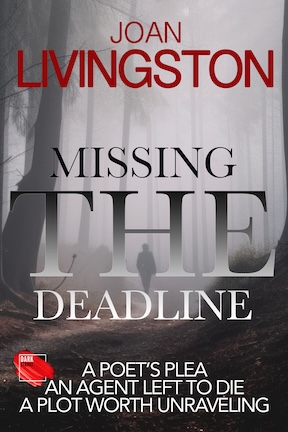When I began writing my mystery series, I aimed to create strong women characters who know what they want and go after it. Topping the list, of course, is Isabel Long, the protagonist of the series, including the latest, Missing the Deadline.
From the start, Isabel was going to be a woman with some good miles on her. A recent widow, she has grown kids and a granddaughter. As for looks, she’s attractive enough to gain the attention of older men, like Jack, the owner of the Rooster Bar where she works part-time.
Isabel had a long career as a journalist — starting as a reporter covering the dinky hilltown of Conwell where she lives to being the top editor of the newspaper until that ended after it went corporate. When the new owner told everybody they had to reapply for their job, Isabel said, “To hell with that.”
Yeah, Isabel is a bit on the sassy side. She’s also savvy, which made her a great journalist. Now, those qualities and other transferable skills come in handy as a private investigator.
For her ‘Watson,’ I chose a 93-year-old mother, who lives with her. Maria Ferreira, a big reader of mysteries and smutty romances, gives her daughter ideas to ponder and even goes on interviews with persons of interest when there isn’t danger. Ma, as Isabel calls her, says she’s bored when they don’t have a case.
I will admit there is a lot of me in Isabel, which makes sense since I write the series in first person. I was also a longtime journalist. Maria was inspired by my late mother. The rest of the characters are fabricated.
I carry many of my characters throughout the seven book, thus far, including a favorite, Annette Waters. Annette — aka the Tough Cookie, Isabel’s secret nickname for her — runs a garage and junkyard that used to belong to her SOB of a father. In the second book, Redneck’s Revenge, she hires Isabel to investigate her father’s death.
I so enjoy Annette’s no-holds-barred personality the men in her life enjoy. Her latest venture is singing lead in a band, fittingly called The Junkyard Dogs. In Missing the Deadline, she develops an interesting and unexpected romance , but no spoilers here.
Also in Missing the Deadline, we encounter new female characters. Wendy Danielson is the devoted sister to Gerald Danielson, a literary agent who was shot and left to die. He survived but isn’t able to run the agency, so she does. There’s also a vindictive ex-wife and a jilted local writer. One of my favorites is Tammy, a tough local gal who cleans for the Danielsons. She happens to be the sister of Lisa, Jack’s pain-in-the-ass ex, who unfortunately for Isabel keeps appearing in these books.
Other interesting women in the series have included Jack’s sister, Annette’s cousin Marsha, Isabel’s daughter Ruth, a woman police chief, a hoarding grandmother, plus the fearless editor of a small town newspaper. So far, only two women have turned out to be criminals. My lips are sealed about that.
But back to Annette. Here’s a scene from Missing the Deadline. In this case Isabel is investigating the shooting of Gerald Danielson outside his home. Isabel and her mother have stopped at a country store after meeting with the man’s sister.
Annette shakes her head.
“You two crack me up. So, what is it? Murder or missing person? Those appear to be your specialties.”
“So far. This one may be an attempted murder, but we don’t know for sure. Right now, people think it was a failed attempted suicide. Poor guy’s a New Yorker who moved to Meadows Falls. Maybe you’ve heard of him. Does the name Gerald Danielson mean anything to you?”
“Ol’ Gerry?” She laughs. “Yeah, I remember him. He used to have my Pop work on his car since we were a lot cheaper than the garages in New York. I believe Pop met his match. A real piece of work that guy. Kind of an asshole. Sorry, Maria,” she says. “I heard he tried to off himself. Didn’t it happen at his home in Meadows Falls? Too bad. Pop got killed in that fire earlier that year. Gerry came to his funeral. He asked if I needed anythin’. I told him to just keep bringin’ his car for me to fix. Course, that changed in the fall.”
I smile while Annette takes a bite of her muffin.
“You have a good memory,” I say. “You said he was a piece of work. Tell me more.”
“Typical New Yorker. He came here with heavy pockets and let us know all about it. Lives on Gorman Road in Meadows Falls. Bought himself a big ol’ house and had it fixed up. Lots of land came with it. But he and Pop got along okay. I’d be workin’ on a car in the garage and hear them go back and forth like two barkin’ dogs. Pop called him Gerry just to get his goat. Gerry called him Waters. He was kind of a dirty old man. The things he’s say to me when Pop wasn’t around. One day I picked up a wrench and said if his dick needed an adjustment, I’d be glad to do it for free. He got the message.”
“I bet he did.”
“We actually got along just fine after that,” Annette says.
As Isabel would say, you don’t mess with the Tough Cookie.
Missing the Deadline, which was released Dec. 21, is available in Kindle. Paperback readers will have to be a little patient.






